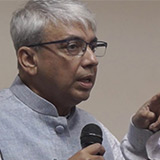Learning to speak ‘American’, and my first paper published
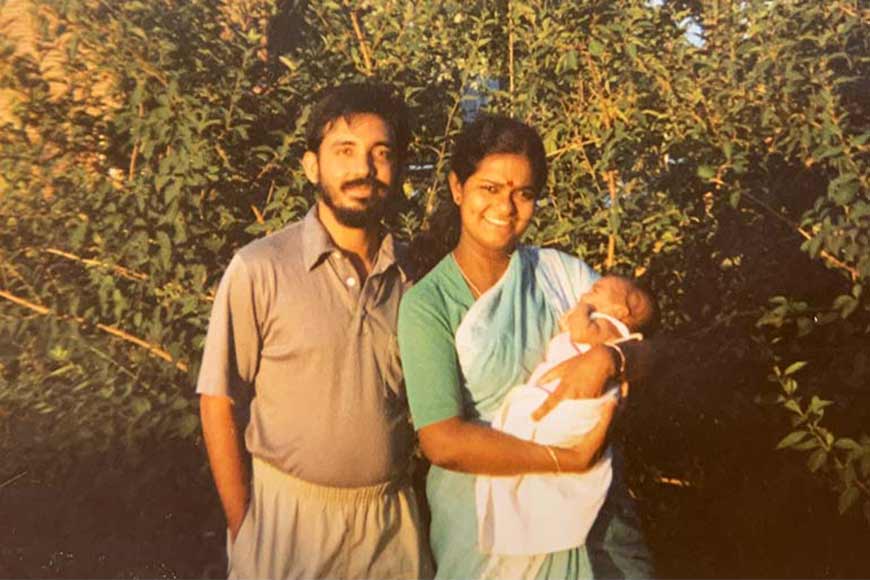
After birth of our daughter we stood at the back of the house
My score of 45 out of 100 in my first Cell Biology exam had come as a big blow. Sitting in our room behind closed doors, Ranjan and I soothed our feelings by calling Weber ‘bread face’. We were so angry - 45 huh? And that Chinese so and so had 95?
But this was temporary. I had never been one to give up. I wasn’t a guy you could keep down so easily (to paraphrase Mujibur Rahman’s ‘amader dabaye rakhte parba na’).
What it took me a long time to realise was that we had been unable to properly answer Weber’s questions because no matter how many books we consulted, the education system of our country had not taught us how to think critically. Bur Mr Zhao from China knew how. This reflects the actual difference in education systems. They dive deep, ask questions, and pose challenges. We merely memorise, and follow our teachers down to the last word. This is no education at all.
Illinois State University, ISU, remains a turning point in my life as a student and teacher.
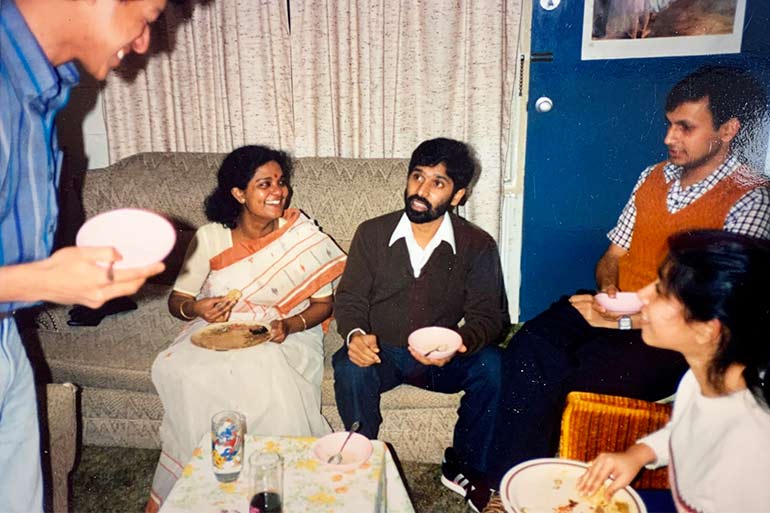 Friends party at our Cardinal Court house after Mukti first arrived in America. Abu Haider (standing), right Sunita Bose and Ranjan Gupta
Friends party at our Cardinal Court house after Mukti first arrived in America. Abu Haider (standing), right Sunita Bose and Ranjan Gupta
Whipped raw and bloody by the fearsome, penalising education system of my country, I needed words of reassurance. I needed to get myself back. Like a rejuvenating tonic. The teachers and student advisors of this small, unknown university in the American Midwest nursed my lost confidence with their affection and encouragement. Which is why, despite leaving no significant mark at ISU, I have never been able to forget that first experience.
Meanwhile, our landlady, the 85-year-old Mrs Harrison, was driving her huge American car 30 miles every Saturday to visit her 80-year-old boyfriend, all powdered face and a string of pearls. Her smile on these occasions was something to behold. Bengali readers will know of ‘80-te Asio Na’ by Bhanu Banerjee. Well, so much for that philosophy. You should come to America to see that far from life ending at 80, you can actually fall in love at 85.
We poor students would laugh at the octogenarian shenanigans. When she returned from her visit to her boyfriend, the old girl didn’t seem all that old. Her generosity was evident too. She would come upstairs to present us with a cake, or voluntarily clear out our trash can. She even showed us how empty plastic milk cartons occupied less space in the trash if we took the air out of them by pressing them with a foot. And hundreds of similar trivia.
By now, we had been promoted to the first floor from the basement. And Mrs Harrison would joke, “You guys are movin’ up fast, ain’t ya?”
Baring our teeth in a grin, we were picking up American English. Movin’ instead of moving. Ain’t instead of aren’t. Harrison on the one hand, Harris on the other. Lisa Harris, the African-American girl who was teaching me how to drive in her own car, was my Biology classmate. And she was teaching me American vocabulary too.
Also read :
A miserable failure in Biology, and I was supposed to be a professor!
Hemanta, Manna, and the battle between two super successful Bengalis
How America deals with PNPC…or not!
Would all colour fade from life forever?
Mericamaya Satkahan: Potato chips with rice, and other trials
Mericamaya Satkahan: Living in the USA…on $380 a month
Mericamaya Satkahan: Friendless in a distant land
We remained classmates later, too. Scanning Electron Microscope by Dr Chuang, laughing at the strange, jerky English accent. Saying ‘orgazination’ instead of ‘organization’, haha.
Not a footpath but a sidewalk, Lisa would tell me. Nobody in America knew what a footpath was. Nobody said university, everyone said school. Cars drove on the right hand side of the road, so you Indians in particular should watch out while crossing the road, she said. As I drove at 50 or 60 mph on the highway or veterans’ parkway, she would say, “Are you sure you never drove before? Gosh you learn fast!”
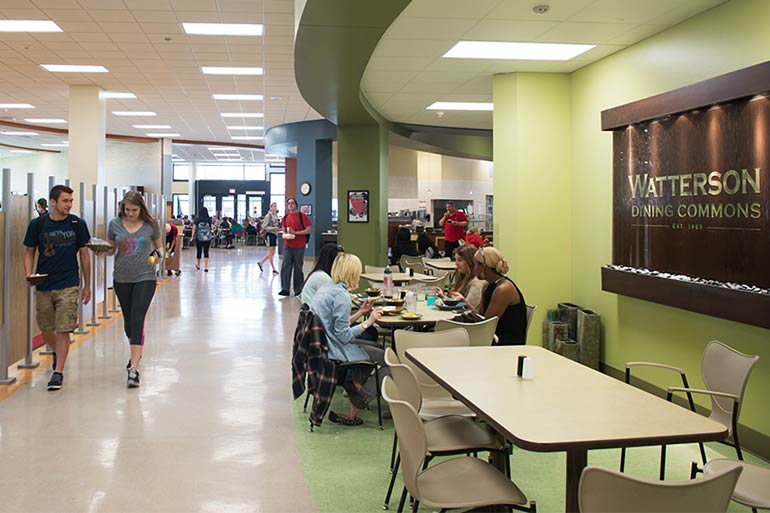 Inside of Watterson Towers
Inside of Watterson Towers
A pavement is not a footpath. Pavement means the actual road. “Never walk on the pavement,” Lisa would warn me. “Never ever. You get killed if you do.” I never knew why Lisa was so kind to me. There was nothing romantic about our relationship. She didn’t have to pay for gas (petrol) to teach a foreign, unknown fellow student how to drive. But African-Americans are like that. My life in America has repeatedly proved it to me. Indeed, they are like the Bengalis from Bangladesh in that respect. As helpful, and as committed to friends.
Meanwhile, realising the situation in his class, Weber drew up a statistical graph thingy to help us pass the exam. By this method, Zhao’s 95 became 100 and, thanks to some complicated statistical formula, we 45-ers turned out to have actually scored 75. I heaved a huge sigh of relief, because the school rules said that in order to hang on to their graduate scholarships, students needed to score a ‘B’ on average in every class, which meant between 80 and 90.
These rules had been explained in detail to hundreds of new students at the massive orientation seminar held in the administrative building’s Julian Hall within a few days of our joining ISU. The person doing the explaining had been graduate student advisor Betty Plummer and her colleagues. A middle-aged, forever cheerful lady, Betty Plummer resembled a large, slow-moving white refrigerator with apple-red cheeks.
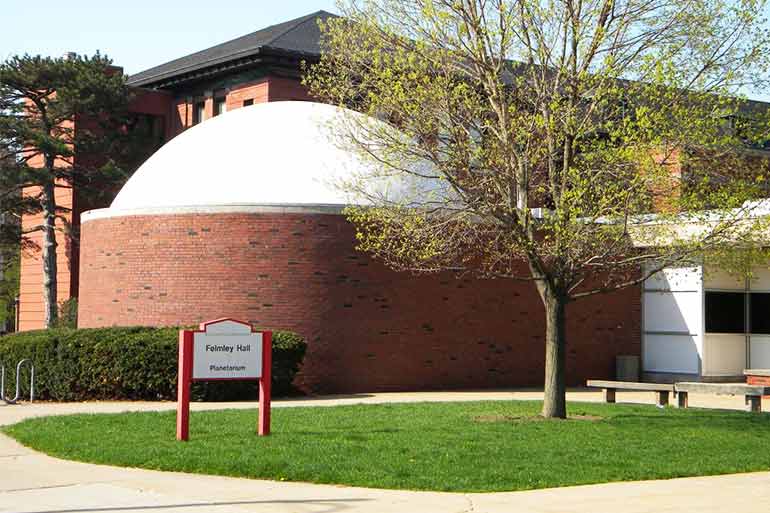 ISU Planetarium
ISU Planetarium
Arriving at her office one afternoon at around 3.00, I found Mrs Plummer all dressed up to go out, wearing a long string of pearls over a dark blue dress. Hot damn!
Seeing me, she said, “Oops, I goofed.” Which sent me back to my 70-30 formula. Understand some, guess the rest. I later looked up ‘goofed’ in the dictionary. Because Uncle Google was not the benevolent presence in our lives then as he is now, the dictionary couldn’t really tell me what ‘goofed’ meant.
“You need to come back tomorrow. Could you please?” Plummer told me. “I have a dinner meeting now. Awful sorry.”
Dinner - at 3.00 pm? Back home, Kartik next door would be having lunch now. So I learned one more thing in America. Dinner at 3.00!
Another Lisa - or was it Tracy? - my memory is playing tricks after 37 years. She taught me how to use a computer. We had to learn how to operate an ancient word processing computer and dot matrix printer within a couple of weeks of joining Dr Roger Anderson’s Ecology class. Tracy at first laughed when she saw my face, and then asked me to go to the computer room of our Biology Department in Felmley Hall at 10.00 pm. Every student had a key to the department, and could work all night if they wanted to. All they had to do was lock up when they left.
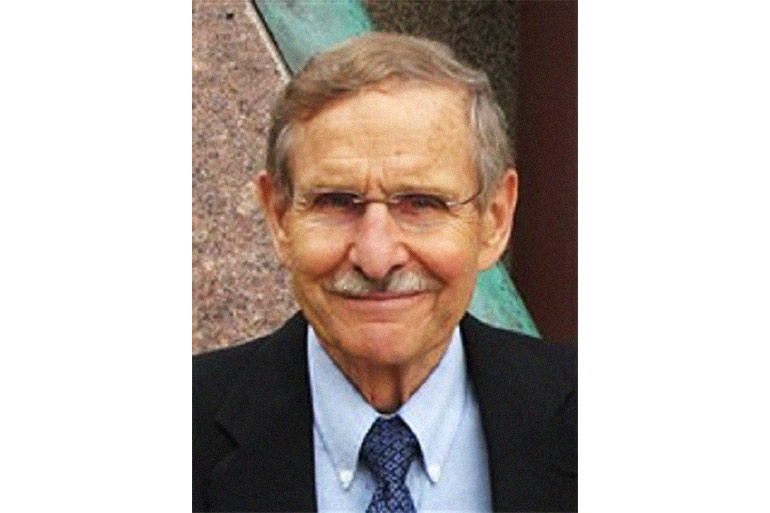 Dr. Roger Anderson
Dr. Roger Anderson
She taught me from 10.00 to 2.00. Then gave me an overview of an archaic statistical programme called SPSSX. All of it was a blur to me, like Hebrew to a Hindi-medium student. Giving up my soul to Ma Kali, I took notes on whatever Tracy was saying. I hadn’t even seen a computer in my life. And now…I came back home at 4.00 am, a cool breeze blowing through the deserted night. The cherry blossoms were asleep around the empty quad. Far away, the two red lights atop the 28-storeyed Watterson Towers were winking at me.
Rumblings in my stomach. Or you call them butterflies.
Out of a class of 15 or 20, five of us scored 95 out of 100 in Anderson’s term paper. Tracy was not among the five.
Anderson published all five papers in some ecology journal. My first paper in America.
(To be continued)
Translated from Bengali by: Yajnaseni Chakraborty
We are happy to present ‘Mericamaya Satkahan’, a weekly column by renowned human rights activist Dr Partha Bandyopadhyay, every Monday on GetBengal







